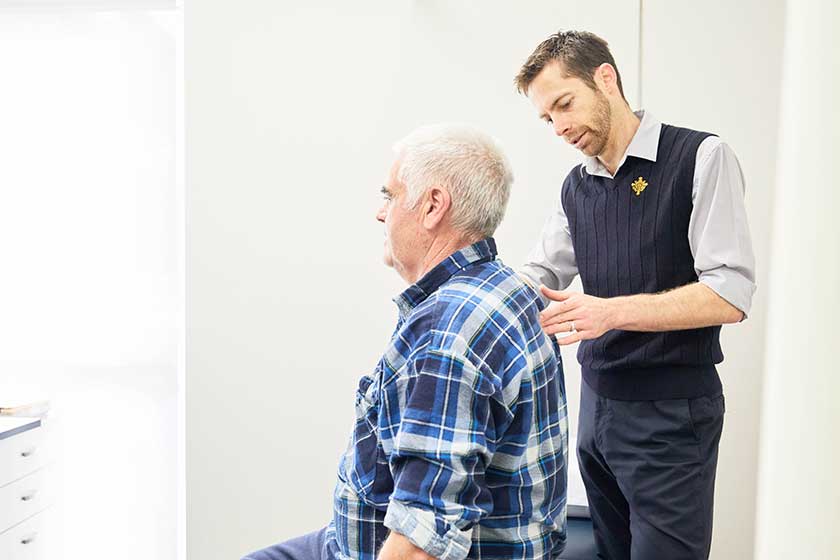First published 5 March 2021. Updated 9 May 2025.
Consultation with your orthopaedic surgeon
Once you have chosen your orthopaedic surgeon, you will see them in their consulting rooms which may or may not be at a hospital. During your appointment with your specialist you will discuss the procedure, risk factors and potential dates/times for your surgery (if required). You may also complete consent forms and health questionnaires.
Your orthopaedic surgeon’s rooms or the hospital will let you know the time to arrive at hospital for your procedure.
Pre-admission appointment
Once your consent and health questionnaire are completed, our admissions caregivers update your details into our hospital systems.
Pre-admission caregivers then contact you to arrange a pre-admission assessment (either in person or over the telephone).
Day of admission
Hospital admission for orthopaedic surgery
When you arrive at hospital, you are directed to our admissions caregivers who review and update your information.
You may be asked to wait for a short while (depending on theatre times and your position on the theatre list). We generally start our nursing admissions from the first patient on the theatre list.
Day of surgery admissions
Our nursing admission caregivers complete any remaining assessments which may include taking your observations, a urine sample, weight and height. You may also be asked to complete any necessary shaving for the area to be operated on and to get into a hospital gown.
Your caregivers will advise you what to do with any belongings you have brought with you – they will either be held in a secure area and transferred to your hospital room after surgery or kept securely in your hospital room.
Once you are ready for theatre you will be transferred to our holding bay area.
Holding bay
When you are taken to the holding bay, your ward nurse will hand over your care to a theatre nurse.
Here, you meet your theatre nurses and your anaesthetist before your orthopaedic surgery. They check your ID and your health information to ensure you are ready for surgery. You will be asked the same questions you have answered already. This is not a mistake. To ensure high standards of care within our hospitals, we have very clear checkpoints throughout your care when we check your ID, allergies, fasting times, and the type of procedure (and what side of the body it is to be performed on).
Surgical theatre
When you are taken into surgery, you meet your theatre team and see your orthopaedic surgeon once again.
From there, your surgeon and the treating team take over, monitoring your wellbeing as they perform your orthopaedic surgery.
Recovery from orthopaedic surgery
After surgery, you are taken straight to recovery where you wake up after your anaesthetic.
Our nurses make sure you are recovering well and managing your pain.
To the ward
If you need to stay in hospital overnight, you are taken to your hospital room. From there, your nurses care for you.
Initially you have frequent observations to ensure you are recovering as planned. After surgery, one of our primary roles is to manage your pain. While it is common to have regular pain relief regimes for many orthopaedic procedures, we also encourage you to identify and communicate any increasing pain to your nurse as early as possible. Pain is subjective and therefore we rely on you to communicate your pain to your nurse (usually out of a score of 10). If you need any help or have any concerns, don’t hesitate to ask.
Getting you moving after orthopaedic surgery
Depending on your surgery type, you may then see your surgeon who will let you know how surgery went and when they expect to see you again next, either in hospital or in their rooms.
You will also meet your physiotherapist or occupational therapist who will help you start moving during your recovery.
What else should I know during my hospital stay?
- Multidisciplinary approach - We have a multidisciplinary team approach for your stay with us at St John of God Health Care hospitals. What this means is that we have a range of professionals, such as nurses, doctors, physiotherapists, occupational therapists, dietitians, care assistants and pastoral practitioners, all working toward the same goal – your care.
- Rights and responsibilities - before you present for admission at any of our hospitals, you will have many conversations about your procedure. As a patient, you have many rights and responsibilities. We encourage you to be active in your care to get the most out of your experience.
Leaving hospital after orthopaedic surgery
Discharge planning
Another vital part of your journey is the planning required for your safe discharge from hospital. Each procedure has an expected duration of stay which is identified prior to your surgery. This is important for you to know, as it ensures that relevant information and education is complete prior to your departure helping to minimise any concerns you may have on your day of discharge.
Most importantly on your day of discharge, you will need someone to drive you home, so make sure you have someone available to pick you up.
Ongoing recovery
Surgery is only one step in your orthopaedic treatment. You may need to have ongoing physiotherapy or occupational therapy and you may be given exercises to help you get movement back into your affected joints.
If you are not sure what to do, give your surgeon’s rooms or physiotherapist/occupational therapist a call.
You can also access home nursing care and rehabilitation services from St John of God Healthcare at Home to help you care for your wound or get you through the first few weeks after surgery.








